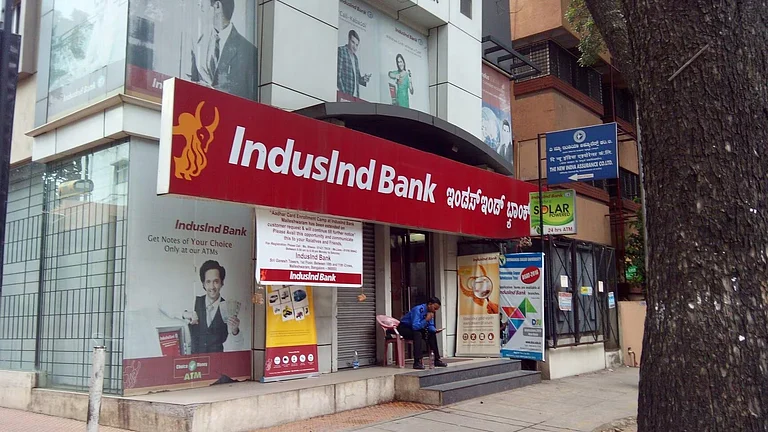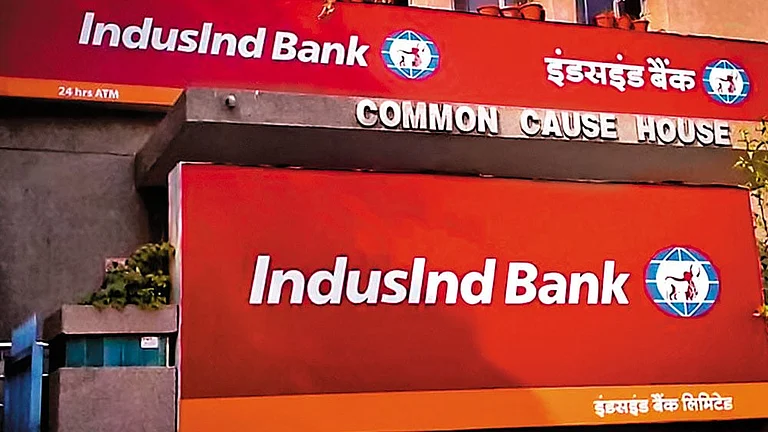IndusInd Bank's mis-accounting saga, which started with "discrepancies" in its derivative portfolio, has now turned into a suspected "fraud" in which the private lender said there might be involvement of some key senior officials. And the result of this series of lapses, which can be dated back to FY16, has led to the company reporting a net loss of Rs 2,328.92 crore for the fourth quarter of FY25.
In its Q4 accounts, the Hinduja Group-backed bank added a long note listing all the issues in its accounts and how they might have happened.
Rs 1,960 Crore Derivative Discrepancies
On March 10, 2025, IndusInd Bank first filed a disclosure stating that, during an internal review of processes related to other assets and other liabilities in its derivative portfolio, it had found discrepancies in account balances.
These "discrepancies" came out as the bank was adopting the Reserve Bank of India (RBI)'s revised Master Direction on investment portfolio norms, which came into effect on April 1, 2024. Banks had to classify investments into HTM, AFS, and Fair Value Through Profit and Loss (FVTPL), with HFT as a sub-category of FVTPL.
IndusInd Bank adopted this framework from April 1, 2024, and recognised a net gain of Rs 185.26 crore (net of tax), credited to the General Reserve. Prior-year figures are not comparable due to the transition.
From the same date, the bank also changed its investment cost calculation from the Weighted Average Cost method to the First In First Out (FIFO) method for better accuracy. Though the impact of this change couldn't be determined, the bank said in its note.
A firm, reportedly PwC, appointed by management, carried out an independent review validating these findings. On March 20, 2025, the Board decided to appoint another independent professional firm (Grant Thornton Bharat) to conduct a comprehensive investigation to, among other things, identify the causes of the discrepancies, assess the completeness and impact of the accounting treatment, pinpoint any lapses, and establish accountability for the persons involved.
The investigations indicated that, from FY16 to FY24, the bank entered into several derivative transactions referred to as “internal trades,” for which the accounting applied was improper and not in compliance with applicable guidelines.
This incorrect accounting led to overstated profits in the ‘Profit and Loss Account’, with a corresponding balance in asset accounts, through FY24. Notional income recognised since FY16 was quantified, and the report identified other assets amounting to Rs 1,958.98 crore being written off as a prior‐period item in the current financial year.
Microfinance Portfolio Lapses
In its review of the microfinance portfolio for the period ended December 31, 2024, the Internal Audit Department (IAD) discovered incorrect recording of cumulative interest income of Rs 172.58 crore. Reversing this error (net of an interim provision of Rs 322.43 crore) resulted in an adverse impact of Rs 422.36 crore in the quarter ended March 31, 2025.
In respect of the issues noted above, the joint auditors of the bank—that is, MSKA & Associates and Chokshi & Chokshi LLP—have filed a letter under Section 143(12) of the Companies Act, 2013, flagging a suspected offence involving fraud.
"The resultant findings from the investigation/review reports, in summary, revealed an involvement of senior bank officials, including former Key Management Personnel (KMP), in overriding key internal controls across the aforesaid functions/areas, and a concealment from the Board and the statutory auditors of the wrongful accounting practices adopted over such period of time, as indicated in the respective investigation/review reports," the auditors said, as per the bank's exchange filing.
New Issues Reported Before Earnings
During its broader internal financial review, the bank also identified—and has since rectified—the following additional errors for the quarter and year ended March 31, 2025:
Interest payments of Rs 99.17 crore on certain borrowing instruments had not been recognised in prior years’ Profit and Loss Accounts.
A provision of Rs 133.25 crore was required against balances in Other Assets not expected to be realised.
Prior‐period operating expenses of Rs 206.00 crore and income of Rs 126.73 crore needed restatement.
The bank reviewed the grouping and classification of Profit and Loss items to ensure compliance with prevailing guidelines. For FY 2024–25, it reclassified Rs 760.82 crore from Interest Income to Other Income and Rs 159.90 crore from Provisions & Contingencies to Other Operating Expenses.
As a result of all the above adjustments, the lender said any financial implications arising from past inaccurate regulatory submissions to SEBI, the Income-tax authorities, or the RBI are currently unascertainable.
Under Regulations 33 and 43 of the SEBI (Listing Obligations and Disclosure Requirements) Regulations, 2015, the aggregate effect of material adjustments made in Q4 and FY 2024–25 (pertaining to earlier periods) amounted to Rs 2,601.94 crore.
Fallouts of IndusInd's Suspected "Fraud"
The issues disclosed in detail by the bank in Q4 earnings have led to a massive reshuffle at its helm. Last month, IndusInd Bank's CEO and Managing Director, Sumant Kathpalia, resigned from his position. A day earlier, his Deputy, Arun Khurana, resigned.
Later, it was reported that Grant Thornton had found suspected insider trading by both these executives and other officials before the bank made the accounting discrepancy public.
Earlier, The Economic Times (ET) had reported that all these issues came to light via a letter by a whistleblower. This letter was reportedly shared with the bank’s management and the RBI just days before Kathpalia’s reappointment by the central bank.
A new Moneycontrol report says SEBI asked IndusInd Bank in April for whistleblower complaints and audit committee minutes. Its probe is ongoing, and an order may be issued within 1–2 months. SEBI is also examining whether the management or board tried to shield officials flagged in the complaints.
Meanwhile, the bank has asked mid- and senior-level officials to disclose their assets and liabilities by May 31, with reminders sent in March and this month.
“RBI is looking into IndusInd Bank accounting discrepancies. Whatever SEBI has to do in relation to it, whatever SEBI’s remit is, SEBI is doing. It is RBI’s remit, but if there are any egregious violations by anyone in its capacity, SEBI is looking into it,” chairman Tuhin Kanta Pandey said, as per the news portal.
IndusInd Bank is currently led by a Committee of Executives, including Anil Rao and Sumitra Sen, under the oversight of a board committee. The RBI has asked the bank to submit CEO appointment proposals by June 30, 2025. The board says the selection process is in its final stage and expects to meet the deadline.
Long Way to Regain Investors' Trust
Since the series of accounting lapses starting March, IndusInd Bank's share prices have nosedived from its 52-week high price of Rs 1,550 to Rs 605.40 in the lower band. Today, investors saw a volatile session as the scrip rose as much as 8% but ended the trade with just 1.82% gain at Rs 785.10.
"Having admitted to multiple accounting lapses, coupled with premature resignations of the top two executives, IIB has lost significant credibility," said HDFC Securities, adding that their "channel checks" also suggest structurally poor regulatory compliance by the private lender in areas such as lending and collection practices, impairment recognition, and aggressive booking of fees across multiple businesses, which could come under deeper regulatory scrutiny.
A sentiment other brokerages share—with Elara Securities—sees more "uncertainty in FY26, which has the potential to further drag earnings; thus, further downgrade to earnings."

































